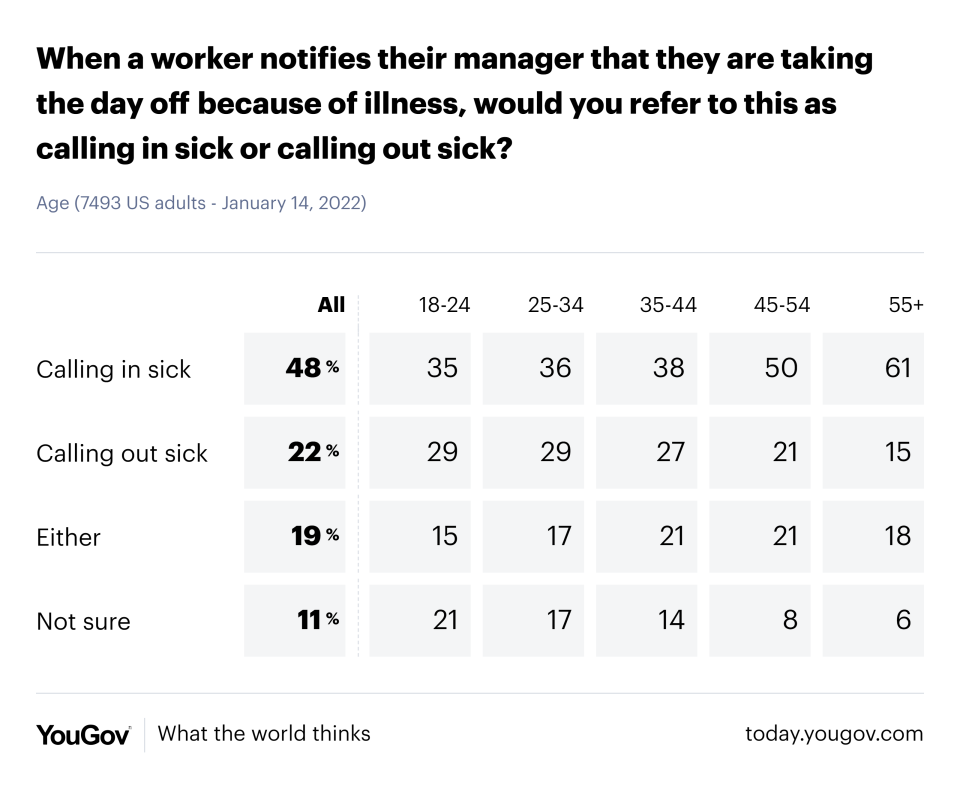Do you call "in sick" or "out sick" to work? We try to answer the question
Here’s the scenario: You’re sick and you need to notify your boss that you won’t be able to work today.
Are you calling in sick or are you calling out sick?
The choice between the two words is one of those little things that stand out if someone picks a different one than the one you’re accustomed to. It’s the sort of question that nags at you, too, which is probably why multiple What and Why RI readers have written in asking for an explanation.
“My Baby Boomer generation, when under the weather would always call IN sick to work. Today's workforce calls OUT sick. What gives?” one reader wrote.
What’s the data on saying call in sick versus call out sick?
The research organization YouGov conducted a survey on this question in 2022, gathering responses from more than 7,000 American adults.
The stats broke down that 48% of all those surveyed call in sick to work, 22% called out sick, 19% used either term and 11% weren’t sure which one they would pick.
YouGov parsed the data out further, looking at factors such as how age, region, gender and even political leanings influenced the answers. Anyway it was sliced, calling in sick was the more popular term, but both age and region factor in.
What and Why RI: Rhode Islanders are in the minority that say grinder. Here's the story behind the sandwich
When it comes to age, people 55 and older strongly favor the term, with 61% calling in sick. The 45-55 crowd also was strongly in the calling in sick camp, with 50% favoring the term. But while the under-45 responders still favored the response calling in sick, the percentages dropped into the 30s, and calling out sick became more popular.
The other factor to consider is that the Northeast region was the least committed to the expression calling in sick, with only 37% of people saying that’s the term they used, compared with 60% in the Midwest. In the Northeast, 34% of people picked call out sick, and 18% used either term.

Where did the term call out sick come from?
The expression “calling out” sick originated in the New York City metropolitan region, Grant Barrett, a lexicographer and linguist specializing in slang and new words, explained in a 2022 episode of the podcast he co-hosts "A Way with Words."
“It’s really about geography,” he told a caller from Vermont, who has the same question as our What and Why readers. He continued, “Really, some of it is about perspective. So are you calling into the office or are you calling that you're going to be out? … Does the out describe you, or does the in describe what you're doing with the call? See what’s happened. I would agree with the latter there. Some people are thinking about themselves being out. And so that's what they're calling about, their being out.”
What and Why RI: Why do Rhode Islanders say bubbler when most people don't? Here's what we found out
He went on to say that because they are phrasal verbs, both ways are acceptable.
“They’re both grammatically correct, and they’re both culturally and sociologically [correct],” he said.
Pinning down exactly when calling out sick started to emerge is a little trickier, but according to Dictionary.com, the idea of calling out started to emerge in the 1970s, as people wanted to express the idea they would be out of the office versus the idea of calling into the office to tell them.
What and Why RI is a weekly feature by The Providence Journal to explore our readers' curiosity. If you have a question about Rhode Island, big or small, email it to klandeck@gannett.com. She loves a good question.
This article originally appeared on The Providence Journal: Is it calling "in sick" or "out sick" to work? Here's what we learned

